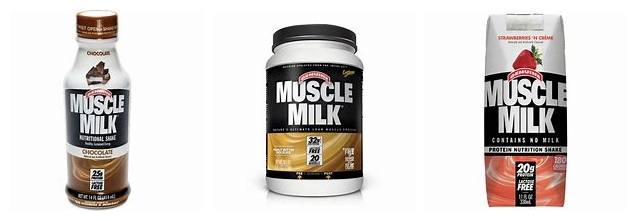Muscle Milk is a popular protein supplement in the bodybuilding and fitness industries. But is it Muscle Milk good for you and your overall health? Below, we will take an in-depth look at Muscle Milk’s ingredients, nutritional information, and safety.
What is Muscle Milk? – Muscle Milk Review

Muscle Milk’s unique formulation claims that it contains proteins similar to those found in human breast milk. These proteins supposedly help to promote new muscle growth, lean muscle gain and stimulate the loss of body fat. Although these claims sound a little too good to be true, their validity has not been measured by any scientific trials so far. Although the majority of Muscle Milk’s ingredients have been proven to stimulate positive physical effects, it is not necessarily a better choice over whole food protein sources.
Nutritional information
According to the nutritional information posted on the official Muscle Milk website, a 35- gram scoop of vanilla Muscle Milk powder contains 150 calories, 6 grams of fat, 16 grams of protein and 9 grams of carbohydrates. Muscle Milk is comprised mainly of a special protein blend that contains whey concentrate, calcium sodium caseinate, whey isolate, milk protein isolate and whey hydrolysate. Several other additives are listed that are used to enhance texture and flavor, such as fatty acids, corn fiber, canola oil, sunflower oil, maltodextrin, soy lecithin, sucralose and fructose.
Quality of ingredients
Muscle Milk contains protein from two main sources, whey and casein, both of which are derived from milk. Both of these proteins contain all of the essential amino acids, making them superior to plant-based protein powders such as brown rice and hemp. When whey and casein are combined, they can provide benefits that isolate protein powders cannot. According to a report published by the National Strength and Conditioning Association, casein helps to slow protein breakdown while way stimulates muscle protein synthesis at a rapid rate. This makes them more useful when consumed together in one supplement than when taken in their isolated forms. Studies have shown that protein powders containing whey provide better lean muscle preservation, hunger control, weight maintenance, blood sugar control and healthy blood pressure levels.
Side Effects
Although Muscle Milk does have a long list of positive effects, there are a few negative ones as well. A report published in a 2010 edition of Consumer Reports showed that Muscle Milk was among a list of protein powder supplements that had tested positive for traces of toxic heavy metals including mercury, cadmium, lead and arsenic. Although many protein powders were tested during the study, Muscle Milk contained the highest concentrations of heavy metals. The main metal that raised concern was cadmium. Michael Harbut, M.D., director of the Environmental Cancer Initiative at the Karmanos Cancer Institute states,” This is a highly toxic metal, and while there are some cases where decisions have to be weighed against relative risks, accepting that you have to be exposed to any cadmium at all in your protein drink after your workout is definitely not one of them.”
Aside from the negative effects reported in the above-mentioned study, Muscle Milk does contain high amounts of whey proteins that have been proven in various scientific studies have a positive influence on body composition, and can reduce the risk factors leading to metabolic disease.
Nutrient Content
When trying to determine the quality of any protein supplement, be it Muscle Milk or any other brand, you should take a moment to look at the various vitamins and minerals it contains, not just its percentage of protein per serving. Muscle Milk contains high amounts of folic acid, phosphorus, potassium, magnesium and calcium. On an ingredient label, this makes it seem like a healthy supplement. However, protein powders that contain added minerals and vitamins are not of the same quality as those found in whole foods, and cannot replicate substances such as antioxidants and phytonutrients that are found naturally in fresh fruits and vegetables.
The International Society of Sports Nutrition recommends that individuals looking to add protein to their diet do so in the form of whole foods and not with supplements. This way, you know exactly which ingredients are going into your body and do not have to worry about toxic heavy metals or artificial sweeteners.
The Bottom Line – Muscle Milk Good Or Bad?
Muscle Milk is widely used by bodybuilders everywhere and has received a lot of very positive reviews. However, there are healthier choices available. When looking to supplement with a protein powder, try to find one that is created from organic sources and contains no added sugars.

